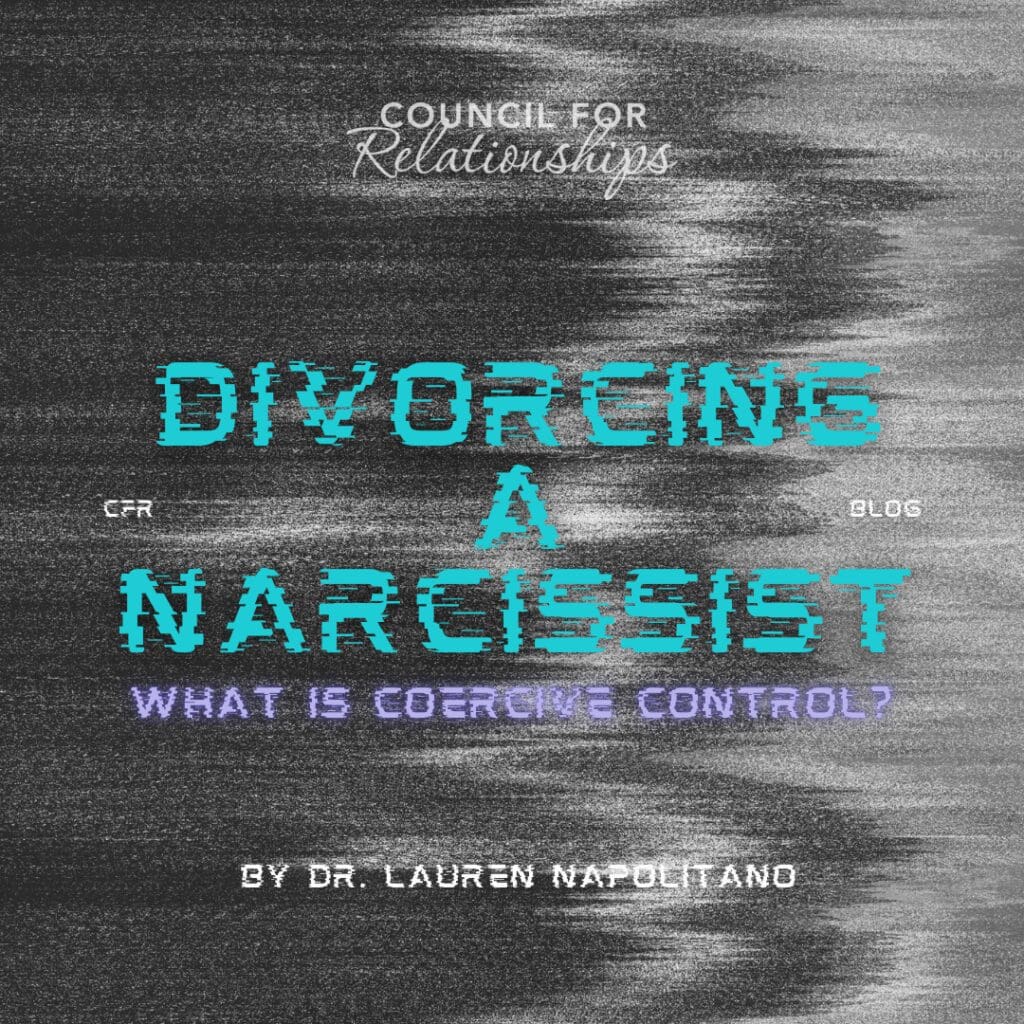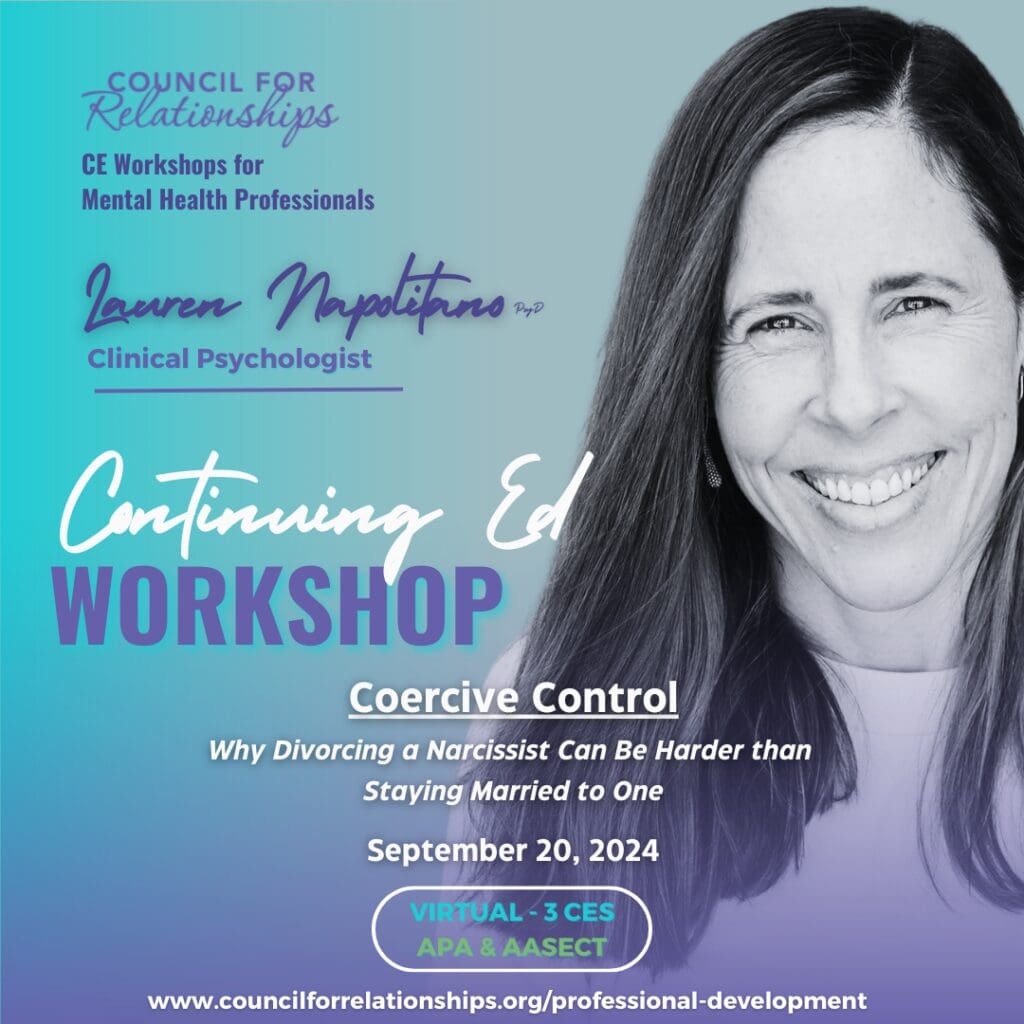Divorcing a Narcissist: What is Coercive Control?
Divorcing a narcissist is more than just a challenging breakup; it’s a battle against deep psychological manipulation and control. In this guest blog, Philadelphia-area psychologist Dr. Lauren Napolitano explores the intense struggles faced by those entangled with narcissistic partners. From the grip of coercive control to the dangers of post-separation abuse, this blog sheds light on the difficult journey to freedom.
 Coercive Control: Divorcing a Narcissist is Hard
Coercive Control: Divorcing a Narcissist is Hard
You: ‘Hiiiii, how have you been? I missed you! It’s been too long!’
Your friend: ‘Sorry about that – my husband and I are trying to devote our weekends to family time. It’s hard to get out! Hahaha. Oh wait, he’s calling me now. Sorry about that. He’s mad at me because I forgot to make his lunch before I left the house. He’s so ridiculous. But I will order him a salad before we leave because he will be in a mood if I come home without food for him.’
We all have a girlfriend or family member whose romantic relationship seems controlling. Maybe her husband picks out her clothing. Perhaps she’s only ‘allowed’ to spend money when she gets permission from her partner. Maybe her partner frequently blows up her phone about his needs when you meet for lunch. Perhaps he doesn’t let her leave the house because he tells her that COVID is spiking.
Chances are that your girlfriend rarely complains about her partner’s behavior. She generally laughs it off, saying that he’s ‘high strung’ or ‘needy,’ but your spidey sense is that this man is controlling. You find his behavior to be selfish, abhorrent, and generally entitled. You cringe every time you see your loved one rationalizing his controlling actions. You wonder why she puts up with this person or how she could be happy in a relationship where her autonomy is compromised.
Maybe you’ve been in a relationship like this yourself. Where you had to walk on eggshells to keep the peace. You felt you had to follow an unwritten list of rules to keep your partner calm. Maybe you’re still in this relationship and have made peace with it.
We have all been there. And we have all watched our loved ones navigate these toxic dynamics.
This kind of relationship dynamic is called coercive control and is common in intimate relationships. Coercive control is a pattern of acts of assault, threats, humiliation, and intimidation used to harm, punish, or frighten the victim. A pattern of controlling behaviors creates an unequal power dynamic in a relationship. It often involves repeated, ongoing, intentional control tactics one partner uses against the other.
Nearly half of all women (48.4%) in the United States experience psychological aggression by an intimate partner in their lifetime. Those who isolate, control, and humiliate their partners frequently evidence narcissistic traits. And while not all narcissists are abusive, all coercive controllers are narcissistic abusers.
Why Divorcing a Narcissist is Almost as Hard as Staying Married to One
While it’s tempting to blame the victim for staying in an abusive relationship, it’s not accurate (or fair) to say that this woman is ‘codependent’ or ‘pathetic.’ Many women in coercively controlling relationships are aware of the abuse but unable to leave due to fear of leaving the abuser alone with their children, religious reasons, or financial reasons.
Many women are hesitant to leave abusive relationships due to the reality of post-separation abuse. In the majority of cases, the abuse that occurs in the wake of separation is significantly more intense than the abuse that was happening during the relationship.
In this presentation, we will talk about the invisible chains of coercive control and the reality of post-separation abuse. We will discuss the many ways in which family court fails abuse victims and rewards narcissistic abusers. There will be a particular focus on the divorce and custody case of Catherine Kassenoff, who was an attorney, mother, and protective parent who lost custody of her children to her ostensibly abusive ex-husband.
Participating in this presentation will teach you more about coercive control – what it looks like, who is more vulnerable to experiencing it, and what happens if you try to end this type of relationship. You’ll learn how this type of relationship begins and the red flags to look for at the start of any romantic relationship. You’ll gain an understanding of why it may be safer to stay in an abusive relationship than risk divorce. And you’ll learn concrete strategies for how to help a friend, family member, or client navigate a coercively controlling relationship.

Register for this virtual workshop.
You’re Invited to Learn More about Coercive Control
Join us on Friday, September 20, 2024, for Dr. Napolitano’s virtual workshop, Coercive Control: Why Divorcing a Narcissist Can be Harder than Staying Married to One. In this presentation, we will talk about the ‘invisible chains’ of coercive control and the reality of post-separation abuse. We will discuss case examples to highlight clinical strategies that can be beneficial to a client who is being subjected to coercive control. This workshop is open to everyone, but if you are a mental health professional, you can earn 3 CEs.
CFR is approved by the American Psychological Association (APA) and the American Association of Sexuality Educators, Counselors and Therapists (AASECT) to sponsor continuing education. Check out all of our virtual Professional Education workshops here.

Dr. Lauren Napolitano (pictured here) is a psychologist on the eastern Main Line of Philadelphia.
About Psychologist Dr. Lauren Napolitano, PsyD
Dr. Lauren Napolitano is a seasoned licensed clinical psychologist with 25 years of experience helping individuals and couples navigate life’s toughest challenges. She specializes in healing from narcissistic abuse, eating disorders, and infidelity, drawing from her work at places like the Renfrew Center and Bryn Mawr Hospital.
Passionate about guiding her clients toward happier, more fulfilling lives, Dr. Napolitano brings both expertise and empathy to her practice. When she’s not helping clients, she enjoys watching reality TV or walking her rescue dog, Jelly. Connect with her on Facebook, Instagram, and TikTok.
More Mental Health Blogs from CFR Therapists & Psychiatrists
CFR’s therapists, psychiatrists, and mental health experts have so much more to share! Dive into the CFR Expert Voices blog for insightful advice on topics like divorcing a narcissist, understanding family dynamics, using attachment theory in therapy, improving relationships, and more. Want to stay in the loop? Join the mailing list for first access to our latest blogs and expert insights!
If you found this blog on the systemic approach to relationships helpful, explore more great content on the CFR Expert Voices blog:
